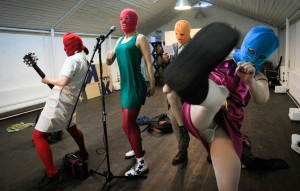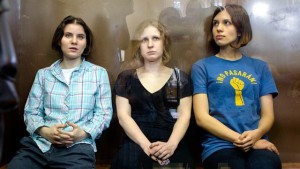Pussy Riot Origins
Pussy Riot, founded in 2011, is a Russian feminist punk protest group with variable membership of around 11 women. They stand for feminism and LGBT rights and are in opposition to Vladimir Putin’s regime and the power of the Russian Orthodox Church. The groups believes in many democratic values such as freedom of speech, and the right to protest the government as well as the freedom of the press. They also are against capitalism and the selfish values that go along with a capitalist system. Pussy Riot’s method of protest is to perform guerrilla concerts in public places singing songs of protest in the punk style. The now famous costumes are meant to spread joy with their bright colors, hopefully inspiring others to rise up and protest with them.
Pussy Riot’s goal is to establish a more democratic society in Russia, free of the reign of Vladimir Putin and his authoritarian tendencies. Their first performance that received a lot of attention throughout Russia was in Red Square in Moscow where they performed “Putin Zassel”, roughly translating from Russian to “Putin Has Pissed Himself” on January 20, 2012. One member speaking to the press said that the performance was inspired by the protests against Putin in December of 2011 in which Russian Security Forces confronted over 100,000 protesters, which turned very chaotic. She told the Financial Times: “We saw how troops were moving around Moscow, there were helicopters in the sky, the military was put on alert. The regime just wet its pants on that day. And the symbol of the regime is Putin.[1]
“Putin Zassel”- Pussy Riot
Column of rebels is moving towards Kremlin.
Windows of FSB rooms are exploding.
Bitches are pissing their pants behind red walls.
Riot announce Abortion of the System!
Attack at dawn? I have no objection.
For our freedom and yours I punish them with my lash.
Madonna in glory will teach you how to fight.
Feminist Magdalene went to protest march
Riot in Russia – charisma of protest
Riot in Russia – Putin pissed his pants
Riot in Russia – we exist
Riot in Russia – Riot, Riot.
Go out to the streets,
Live on the Red,
Show the freedom
Of civic anger
Discontent with the culture of male hysteria
Savage cult of the leader devours your brain
Orthodox religion of hard penis
Patients are offered treatment by conformity
The regime is moving towards censorship of dreams
It’s about time for blasting confrontation
Pack of bitches of the sexist regime
Begs the feminist wedge for forgiveness.
Riot in Russia – charisma of protest
Riot in Russia – Putin pissed his pants
Riot in Russia – we exist
Riot in Russia – Riot, Riot.
Go out to the streets,
Live on the Red,
Show the freedom
Of civic anger
Punk Prayer Performance
On the morning of February 21st 2012, five young women walked into Moscow’s Cathedral of Christ and Savior. Wearing their signature, sleeveless dresses, neon tights, and balaclava ski masks, they jumped onto the sacred alter, took out electric guitars and started to perform “Punk Prayer”. The song was a mix of punk music and traditional orthodox chant with words about the close relationship between Putin and the Orthodox Church. It criticized the Church’s conservative anti-woman and anti-LGBT stances and addressed the Mother of God directly telling her to “oust Putin” and “become a feminist”. The performance was shut down in a matter of minutes but it managed to make a huge impact on Russian politics and the world. Three women were arrested right then and there, Nadezhda Tolokonnikova, Maria Alykhina and Yekaterina Samutsevich. They were denied bail and held in custody until their trial in late July. They were convicted of “Hooliganism motivated by religious hatred” and sentenced two years in prison. In the appeal Samutsevich was released because it turned out that she never made it to the alter and committed what she was being charged for. The other two lost the appeal and were sent to two separate Russian prisons.
“Punk Prayer”- Pussy Riot
Black robe, golden epaulettes
All parishioners crawl to bow
The phantom of liberty is in heaven
Gay-pride sent to Siberia in chains
The head of the KGB, their chief saint,
Leads protesters to prison under escort
In order not to offend His Holiness
Women must give birth and love
Shit, shit, the Lord’s shit!
Shit, shit, the Lord’s shit!
(Chorus)
Virgin Mary, Mother of God, become a feminist
Become a feminist, become a feminist
(end chorus)
The Church’s praise of rotten dictators
The cross-bearer procession of black limousines
A teacher-preacher will meet you at school
Go to class – bring him money!
Patriarch Gundyaev believes in Putin
Bitch, better believe in God instead
The belt of the Virgin can’t replace mass-meetings
Mary, Mother of God, is with us in protest!
(Chorus)
Virgin Mary, Mother of God, put Putin away
Put Putin away, put Putin away
(end chorus)
Their trial became a symbol of Putin’s authoritarian tendencies and the censorship of political ideas in Russia. While the Russian government continues to deny the political aspect of the performance and the arrest, there is no question that the criticism of the Russian government, Putin and the Russian Orthodox Church was an important reason why they were arrested and tried so harshly. There was wide criticism of the government following the arrest from supporters of Pussy Riot around Russia and the western world. Within Russia there was also a large group that was highly supportive of the arrest and were offended by the performance at the alter. Many of these people were highly religious and supportive of Putin’s reign. If there was any consensus in across the diverse political and social spectrum in Russia, it was that Pussy Riot sharply divided society. There were those that thought that the Pussy Riot arrest was outrageous, unfair and another symbol of Putin’s oppressive government. On the other side there were those that thought that that the women were not receiving enough punishment. There was talk of bringing back corporal punishment, from flogging and birching to tarring and feathering.[2] Many of these people interpreted these women as a threat to the Russian state. A threat to the order that their beloved Eastern Orthodox Church and Putin provided. Within Russian politics there was criticism from all sides. Even outspoken critics of the Putin government criticized the women. Boris Nemtsov, a leader of the liberal-democrat coalition and a regular critic of Putin spoke outside the courthouse. “If I could get my way, I would spank these girls and let them go. Whats going on here is sadism and cruelty.”[2] Criticizing the Pussy Riot women unwittingly united the Russian Left, Right and centrists all. In Bernstein’s article on the Pussy Riot affair, she points out the sexist aspect to all these comments about violent actions towards the women’s bodies.
Reaction From The West
The reaction from the west, unlike in Russia, was almost completely positive. Pussy Riot became a symbol for the freedoms that western democracies stand for: the freedom of speech and the freedom to protest and criticize the government. Many famous voices stood behind Pussy Riot including artists and musicians, politicians and business people. There was an international uproar against the Russian government and its oppressive policies. It became the perfect opportunity to criticize the Putin government, something the west loves to do as a leftover sentiment from the Cold War. It was unusual how much people, outside of Russia, paid attention to the arrest and trial. There have certainly been other outrageous arrests of political activists in Russia and all over the world that did not gain that much attention. The members of Pussy Riot that were arrested were popular because they held attributes that other activists didn’t. They were young, beautiful women, that were well spoken and they loved the attention. They had the celebrity quality that people from the west love.
Shortly after the arrest and during the trial, Madonna had a concert on Russia. She spoke in support of Pussy Riot and how brave they were for fighting the Russian government. After the women were released shortly before the 2014 Winter Olympics, the women took a tour of the U.S., making speeches and appearances. The women were invited to perform at the Grammys with Madonna and invited to many other performances. The women refused, saying that they only perform political protests and they will never perform in which people have to pay for tickets to see them. Pussy Riot’s values are in many ways, way more radical then many of the famous celebrities that spoke in favor of them. Pussy Riot may be against the values of the Russian government but they are also against capitalism. Capitalism is one of the values most celebrated in the U.S and other western democracies. The outpouring of support was in some ways superficial in that many of the supporters did not support their values but simply supported their right to protest against the Putin government. It also seems that the west is all too happy to criticize the Russian government any chance they get. It is certainly a remnant of the Cold War era, in which everything the Soviet Union did was pure evil. There are many governments around the world that are more oppressive towards their citizens then Putin is. The reason this got some much attention and many other missteps by Russia, definitely comes from sentiments of the Cold War.
In the next section, I speak about the importance of the Cold War era when talking about democracy in Russia today. Not only does the Soviet era affect relations with the the west, it lays a heavy curtain over the version of democracy that exists in Russia today.
[1] Clover, Charles. (2012) “Pussy Riot Dig Claws into Putin”. Ft.com/world. Financial Times.
[2] Bernstein, Anya. An Inadvertent Sacrifice: Body Politics and Sovereign Power in the Pussy Riot Affair. Critical Inquiry. 2013

